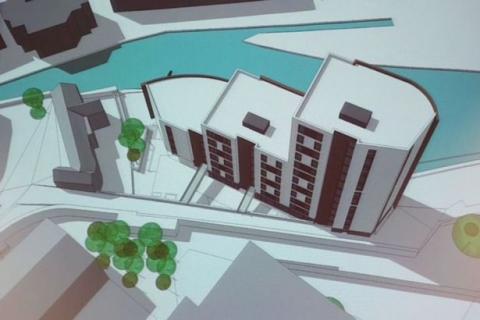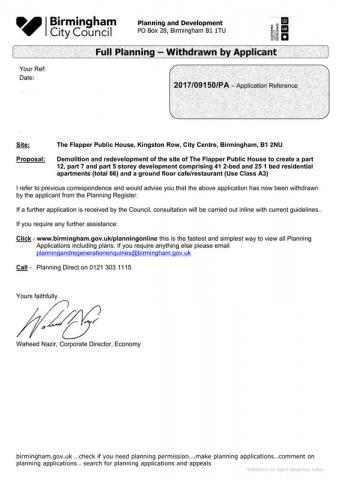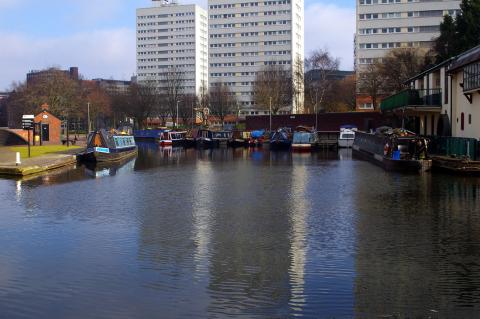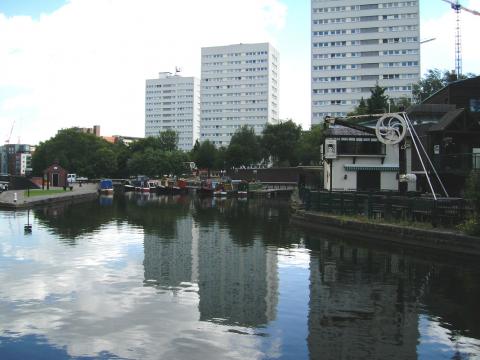Plans for The Flapper dropped – but pub still set to shut
May 2018 - Developers have withdrawn plans to knock down the iconic music venue, The Flapper, in central Birmingham and replace it with a block of 66 flats up to 12 floors high – but it doesn't mean the pub is saved, or that Cambrian Wharf, on which it stands, will not still face dereliction and redevelopment, as Peter Underwood reports.
Waheed Nazir, Birmingham City Council's Corporate Director for Economy, has told objectors to the Flapper demolition that Whitehorse Estates Ltd and Baskerville Wharf, a Private Limited Partnership, have now withdrawn their plans to demolish The Flapper Public House, alongside moorings in Cambrian Wharf, and redevelop the site to create a part 12, part 7 and part 5 storey development of 41 two-bed and 25 one-bed residential apartments and a ground floor cafe/restaurant.
He says that if they apply again they will have to go through the consultation process all over again.
The development of nearly 70 flats on a tiny, canalside site faced objections from boaters, concerned about the impact on Cambrian Wharf moorings, which include fully residential boats, music fans and pubgoers angry at the loss of one of Birmingham's few live music venues and, after long thought, Canal & River Trust.
Whitehorse Estates Ltd and Baskerville Wharf, own the lease on the land from Birmingham City Council and attempted to persuade local residents to back their plans by staging an exhibition of their planning proposal; but locals and music fans united with boaters to object to the planning application.
As the planning consultation was closing, the Canal & River Trust also put in a powerful, formal objection to the city council, saying it should not go ahead.
In a move welcomed by boaters and music fans alike, Canal & River Trust asked Birmingham City Council to reject plans by a developer to flatten The Flapper when, C&RT's Ailith Rutt, Planning Manager for the Midlands said the development was too big and out of place: “The height, scale, massing, materials and design of the proposed development would cause a visually overbearing impact on the canal basin and surrounding environment and result in an anonymity of architecture around the basin which would be unsympathetic to the heritage context and existing built form of the site and its surroundings,” in planners' language.
And boaters were at the heart of the C&RT objection with Ailith Rutt complaining: “No information has been submitted to assess the impact of shading on the residential moorings or on the recreational use of the basin.
“The noise assessment does not consider the impact of the existing use of the basin on the amenity of future residents.”
She also pointed out: “The basin contains four residential moorings and as such the residential amenity of those living in the basin and any impacts on them caused by the proposed development should be considered, as it would for those living or staying in built form near the site.
“The impact of existing activities in the basin on potential new residents should also be given consideration. There is also a mix of long and short-term moorings within the basin whose activity and amenity also needs to be considered.”
Ailith Rutt made a strong plea on behalf of boaters in Cambrian Basin, and any potential residents of the proposed flats, saying: “Due to its orientation, the proposal would shade the waterspace and therefore the boats in the basin. The proximity of existing and proposed residential accommodation raises some concern.
“Matters such as the amenity and privacy of those residing on boats in the basin must be fully considered, as ground floor uses looking out over the basin include living and bedroom space. This could result in overlooking and loss of privacy, as well as the overbearing impact of the height of the building on boaters who reside below ground level and to whom it thus appears even taller.
“The boats in the basin may run generators or use stoves to generate power and heat. The noise assessment does identify the canal and its users as sensitive receptors, but does not appear to consider them as noise generators with the potential to impact upon the residents of the proposed development. Therefore, no assessment has been made of the potential for noise disturbance from the boats, which should be considered, as well as the impacts of the proposed development on the boaters.”
Ms Rutt was scathing about the developer, saying their 'assessment of the impact of the proposed development on the surrounding environment is less thorough and results in conclusions that appear to have no evidence behind them'.
Despite alomosty universal condemnation of the plans, expert observers suggest this may not be the end of the developers' attempts to develop the site; as it is common practise to withdraw a planning application that looks doomed to failure in order not to have a black mark against the principal of developing the site.
It now seems unlikely the developers will offer another temporary lease to The Flapper's current landlords. They have been trying to keep the venue open but are saying the developers still want them out, despite withdrawing the planning application.
The cynical might suggest that the developers would not be averse to the Flapper being abadoned and becoming an eyesore on the edge of Cambrian basin, as that might assist any future planning applications, with the authorities anxious to avoid deriliction of this key part of Birmingham's history.
The Baskerville company, based in Stratford upon Avon, owns a 99 year lease on The Flapper site from the city council expiring around 2068.
Photos: (1st) The developers plans for 66 flats, (2nd) How the developers saw the flats replacing the pub, (3rd) Birmingham City Council's announcement of the withdrawal of the planning application, (4th) Cambrian Wharf moorings with The Flapper on the right, (5th) The Flapper - one of Birmingham's best live music venues.










